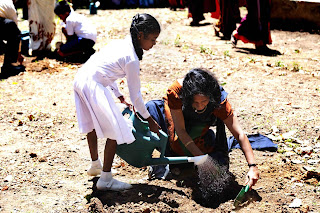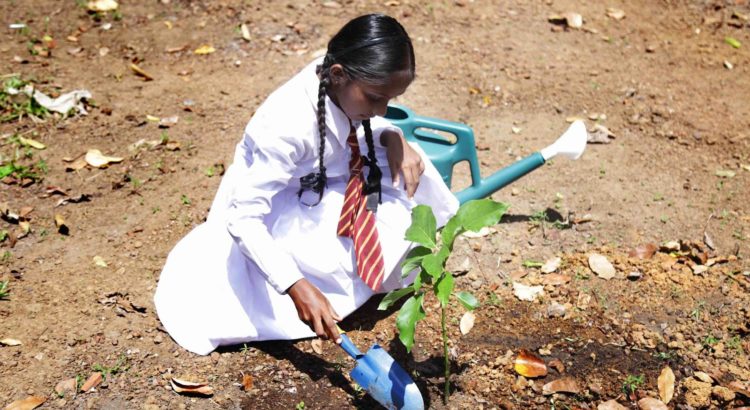Sri Lanka/July 11, 2017/By Abdul Mujeeb/Source: http://www.elankanews.com
The Food and Agricultural Organization of the United Nations (FAO) together with the Ministry of Education hosted a ceremony on Tuesday, 4 July 2017 at Wijerama Maha Vidyalaya in Udahamulla, Nugegoda to highlight the importance of school gardens for child nutrition and life skills. The event took place in the context of the project on “Scaling up Nutrition through a Multi-Sector Approach”, jointly implemented by FAO and the World Food Programme (WFP) in collaboration with the Government of Sri Lanka.
Through this project, more than 6000 schools have been inspired to create their own organic and healthy garden within the school grounds. To support each school develops their own garden, FAO together with the Ministry of Education has facilitated a series of training workshops in all nine provinces, training 377 education officers.
 |
| Nina Brandstrup, FAO Representative for Sri Lanka and Maldives presents gardening equipment to principals of 22 schools in the Sri Jayawardenapura Education zone at the school garden ceremony. |
At these comprehensive two-day workshops, education specialists have learned the different aspects of establishing and managing school gardens, from selecting a location and deciding the type of beds to create, to identifying the best tools and equipment. They have also learned about fertilizing, pruning and pest control by utilizing plant extracts and modern technologies. The education specialists have acquired the skills to impart this knowledge to the school community within each province. They have been provided a guideline and manuals which teachers, parents, and children can use in establishing the school garden. As the project includes knowledge about child nutrition, health, and education, it encourages the children to directly apply what they learn in their school gardens and replicates the same healthy habits at home. FAO has distributed gardening tools and resources to participating schools across the island to support the project’s sustainability.
A manual available in both Sinhala and Tamil has been crucial to the success of the initiative and has reached over 300,000 children across the island. In many parts of the country that continue to struggle with food insecurity and undernutrition, this initiative has supported children to take responsibility for their diets and share their learnings with their families and the wider community.
 |
| Priyanthi Chandrasekera, Project Manager- Scaling up Nutrition through a Multi-Sector Approach, FAO plants a tree with a student of Wijerama Maha Vidyalaya. |
Speaking at the event, the FAO Representative Nina Brandstrup highlighted school gardens as a key tool in teaching children the value of nutritious organic food and the importance of sustainable lifestyles. “School gardens can be used as a classroom by reconnecting children with the outdoors and the source of their food,” she said. “These gardens teach children about the importance of a balanced diet and nutrition while opening their eyes to new agriculture concepts. The gardens are also encouraging the children to increase their consumption of fruits and vegetables; no one can resist eating what they grew with their own hands!”
The Honorary Consul of Spain, Priyadarshini Jayawardena encouraged the promotion of school gardens to keep children safe and healthy while nurturing future generations to ensure a healthier and better tomorrow. “Gardens are of utmost importance to the development of the country. Well-nourished children are healthier and learn better, have improved opportunities for growth and contribute positively to society,” she said.
Commenting on the programme, Mr. Jayantha Wickramanayake, Director of National Schools said: “This project jointly implemented by the FAO and the Ministry of Education is a good solution to tackle health problems and the lack of awareness about the environment among school children. This programme really takes education beyond the classroom, guiding students to form a relationship with nature. I encourage all principals, teachers, and students to replicate this model in their schools. I have no doubt that this will help to create a healthier generation of youth and contribute towards minimizing the risk of natural disasters in the country with more awareness.”
Brenda Barton, Representative and Country Director of World Food Programme (WFP) highlighted that the school garden initiative ties in with the efforts of WFP to treat undernutrition in Sri Lanka. WFP distributes specialized fortified nutritious food to pregnant and nursing women and children aged between 6 months and 5 years and provides technical support to the Ministry of Health to enhance the impact of Thriposha – a nutritious and locally fortified blended food. “Our aim is to support behavioral changes through enhanced nutrition education and information on safe and nutritious foods, dietary diversity, nutrient deficiencies and their root causes,” she said. WFP also supports the Ministry of Health to conduct national nutrition surveys for pregnant and lactating women and for schoolchildren, to promote the linkage of health, nutrition, and food security as a national development priority.
The event concluded with the distribution of gardening tools to 22 school principals from the Sri Jayawardenapura Education zone of the Western Province, and the planting of a fruit tree followed by a visit to the school garden by guests and the school community.
School gardens are one aspect of the Scaling up Nutrition through a Multi-Sector Approach project, jointly implemented by FAO and WFP in collaboration with the Government of Sri Lanka. The project is part of the United Nations Sustainable Development Goals Fund, an international multi-agency and multi-donor development mechanism created in 2014 by The United Nation Development Programme (UNDP) funded through the Government of Spain.
Source:
http://www.elankanews.com/2017/07/fao-and-ministry-of-education-support.html







 Users Today : 22
Users Today : 22 Total Users : 35460039
Total Users : 35460039 Views Today : 30
Views Today : 30 Total views : 3418661
Total views : 3418661